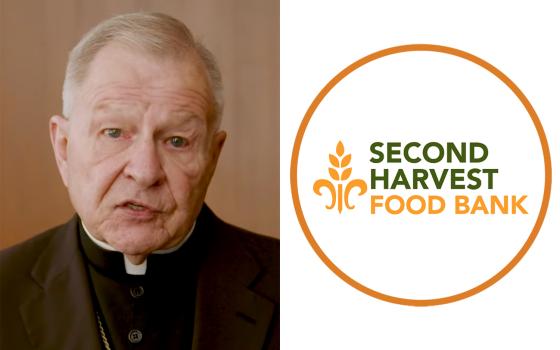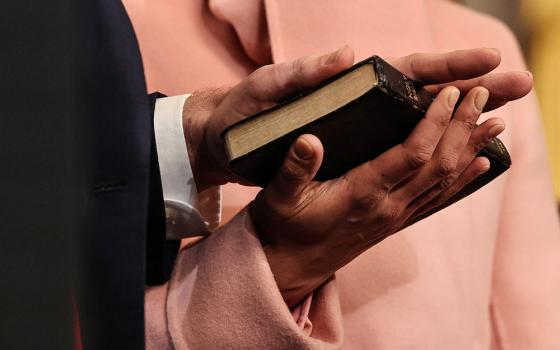Everything about Donald Trump’s appearance at Liberty University yesterday was strange, including the mere fact of it. Trump was clobbered for a reference to ‘Two Corinthians” rather than “Second Corinthians,” although many people, including myself, often write “2 Cor” to refer to that book of the Bible. In any event, that was the least of the issues raised by Trump’s appearance and what he had to say and how his audience reacted to his speech.
Liberty University was founded by the late Rev. Jerry Falwell in 1971. From the start, he envisioned the school, first known as Lynchburg Baptist College, as an extension of the church, and insisted that he, as pastor, exercise control over what was taught. “Anytime [the teachers at the school] start teaching something we don’t like, we cut the money off,” Falwell said. “It’s amazing how that changes philosophy.” When very few students had signed up that first summer to begin classes in the fall, Falwell had the idea of offering a free trip to Israel for all students, which produced 154 applicants by the time the inaugural semester began. There was no campus, and the school rented houses in the town, sometimes putting as many as nine boys in one room. The classes were held in the hallways of the Thomas Road Baptist Church. But, over time, Falwell’s entrepreneurial talents, at fundraising and recruiting talented evangelicals to teach and administer the school, prevailed and Liberty Baptist University is now the largest Christian university in the world if you count the profitable online learning students.
Here, then, we see a point of convergence between Falwell’s legacy – the school is now run by Jerry Jr. – and the Trump phenomenon. Everything about Falwell’s approach to ministry had the flavor of entrepreneurialism about it. When I studied his life extensively, while researching the biography I wrote of Falwell, it was impossible not to admire his energy and creativeness, while at the same time recognizing a distinctively American negation of the Gospel by making it subservient to non-Christian worldviews. Trump was not really an odd fit at Rev. Falwell’s university so much as his speech highlighted what, for me, was the strangeness of the Falwell vision from the start.
Consider Trump’s call for Christians to unite. Now, all of us who are baptized should take serious cognizance of the Lord’s prayer that “all may be one.” But, Trump’s call for unity was not, alas, founded on any ecclesiological sensibilities. “Christianity, it’s under siege,” he thundered “We don’t band together. Other religions, frankly, they’re banding together … we have to unify.” The last time I checked, Orthodox Jews were not “banding together” with Shiite Muslims, and Shiite Muslims were not banding together with Sunni Muslims, and Hindus and Muslims in India were not banding together. What was he talking about?
It is doubtful, too, that Trump has any particular concern for the plight of Christians in the Mideast. After all, many of those dark-skinned Christians in Syria are refugees, and we all know that in Mr. Trump’s moral universe, refugees are as dangerous as another set of dark-skinned Christians, those immigrants who are fleeing the narco-violence of Central America and coming to America in search of a better life. If a Mideast Christian happened to live in the U.S. already, they would as likely be among those Trump dismisses as “losers” as among those he champions as “winners.”
Which leads to the principal reason Trump’s appearance at Liberty, awkward though it was, nonetheless seemed fitting. Falwell the preacher and Trump the candidate share a Manichaean worldview, in which everyone is constantly being divided into “us” vs. “them,” the sheep and the goats, the winners and the losers. Falwell, of course, considered “the secularists” among the goats, and it is hard to imagine a more thorough-going embodiment of secularism than Donald Trump, but Falwell was never one to shun a star in the secular firmament if they were willing to kiss his ring. Falwell and the Religious Right he epitomized the ugly divisiveness in American politics that Trump has turned into an art form, and into a ticket to the top of the polls. Falwell did not invent political divisiveness, to be sure. Historians of the 1800 election between John Adams and Thomas Jefferson have ably documented the vileness to which our venerable founding fathers could descend. But, American politics became more coarse, less functional, and more nasty as a result of Falwell’s foray into politics, and the attitudes of those he brought with them. On a range of issues, from economics to foreign policy to climate change, the fundamentalist mindset has been a bulwark against social justice and its claims. Still, while a Manichaean framework is the most crude variety of moral analysis, as noted yesterday, the Democratic candidates seem allergic to any moral framing of issues. Voters need something to make sense of the worldviews of the candidates, and even a crude moral framework is better than none at all.
I say “Trump the candidate” for a reason. Trump the man has little in common with Falwell. Whatever else one thinks of the late reverend, he was sincere in his beliefs whereas Trump’s life is not one characterized by ideological purity of any kind, let alone the Christian conservative kind. This is why the appearance was jarring to me: Jerry Jr. was more than polite in his introduction of the candidate; He seemed complicit in the charade Trump is playing. And that is the scary part. If Jerry Jr. is half as shrewd as his dad was, he kissed The Donald’s ring because he thinks he is going to win. Trump’s life has not been particularly devout. If he has had any kind of conversion it is of the most unconvincing kind. He is a snake oil salesman who happened to be skilled at real estate. But, Jerry Jr., like Jerry Sr., is not going to shun a winner. The shamelessness of the preacher host was only marginally less remarkable than the shamelessness of the candidate guest.
Mr. Trump has taken to bringing his family Bible with him on the campaign trail. If he were to open the book, he would find Jesus saying “Blessed are the meek, for they shall inherit the earth.” One wonders what Mr. Trump makes of that particular verse. No one at Liberty University thought to ask him but, then, the school’s founder was not exactly a champion of meekness either. No one pointed out that it is God who judges, separating the sheep from the goats, not the impersonal laws of the market. No one challenged Trump’s shallow, Norman Vincent Peale-style invocation of personal power. They applauded his anti-immigrant screed, apparently forgetting the multiple biblical injunctions to care for the stranger. The sight of Donald Trump at Liberty University may have been jarring at many levels, but the reality is they deserve each other.



